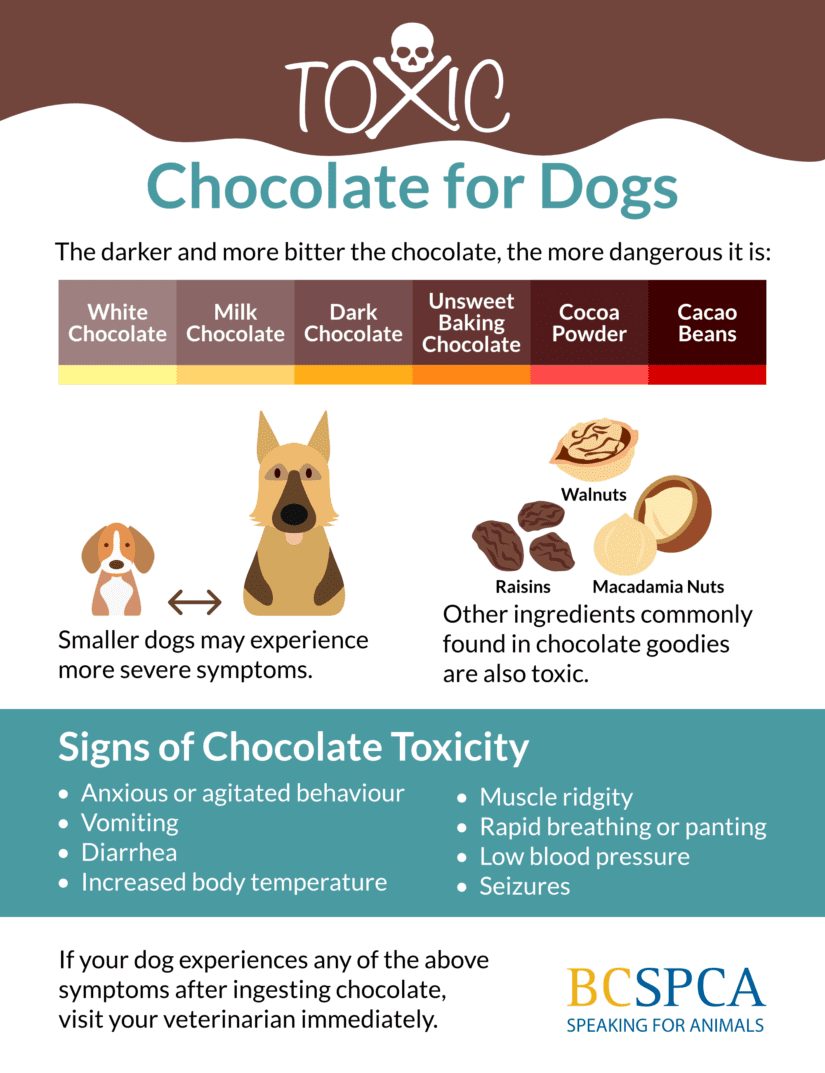Most humans love indulging in their favourite chocolate treat but unfortunately, ingesting chocolate can result in significant illness for your dog. Chocolate is toxic for your dog because it contains both caffeine and a chemical called theobromine which are both from the methylxanthine family; two chemicals that dogs cannot metabolize as well as humans.

While all types of chocolates can be toxic for dogs, the amount of methylxanthine varies within each type. Here’s what you need to know about the different types of chocolate that are toxic for your dog.
Which types of chocolate are more toxic for your dog?
The darker and more bitter the chocolate, the more dangerous it is for your dog. This is because dark chocolate and baking chocolate contains more methylxanthines per ounce.
The list below includes the estimated amounts of methylxanthine in each type of chocolate in milligrams (mg) per ounce (oz) from highest to lowest.
- Cacao beans: 300-1500 mg/oz.
- Cocoa powder: 400-737 mg/oz.
- Unsweetened baking chocolate: 390-450 mg/oz.
- Dark chocolate: 135-450 mg/oz.
- Milk chocolate: 44-60 mg/oz.
- White chocolate: 0.25 mg/oz.
It should be noted that while white chocolate contains very little methylxanthine per ounce, your dog can still get sick from the sugar and fat content, so you shouldn’t feed any chocolate to your canine friend.
How your dog’s weight plays a role
Chocolate is toxic for your dog no matter what. You should always consult with your veterinarian if your dog has consumed chocolate. However, your dog’s weight is also an important factor to consider along with the type and amount of chocolate eaten. For example, a 10-pound dog that eats a smaller amount of dark chocolate may experience more severe signs compared to a 50-pound dog who eats the same amount.

Other toxic additives found in chocolate
In addition to the chocolate itself, other ingredients that can be found in chocolate bars and other goodies – like raisins, walnuts, macadamia nuts, and caffeine – are also toxic to dogs. In addition, the fat content in chocolate can lead to pancreatitis.
No matter how you look at it, it’s a good idea to be cautious whenever you’re consuming any chocolate treat within close proximity to your dog.

For cat lovers
Chocolate is also toxic to cats for the same reasons it’s harmful for dogs — they cannot metabolize theobromine. Cats are less likely to eat human foods like dogs do — in fact many find chocolate unpalatable – however, to be safe, keep chocolate far away from your cat as it can be lethal for them.
Signs of chocolate toxicity in your dog
- Anxious or agitated behaviour
- Vomiting
- Diarrhea
- Increased body temperature
- Muscle rigidity
- Rapid breathing or panting
- Increased heart rate
- Low blood pressure
- Seizures
- Advanced signs (cardiac failure, weakness, and coma)
There is no cure for chocolate toxicity, veterinarians can only treat the symptoms. Chocolate toxicity can be fatal. If your dog experiences any of the above symptoms after ingesting chocolate, visit your veterinarian immediately for assistance.
Extra Resources
Is peanut butter toxic for dogs?
Get updates from the BC SPCA
Want to receive more pet tips like this, right in your inbox? Use the form below to subscribe for updates.
